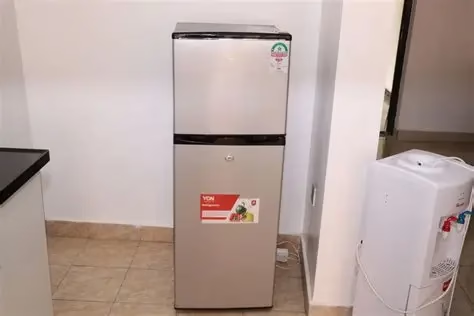In Nairobi’s vibrant urban landscape, where electricity costs can be a significant household expense, every shilling saved counts. Among all home appliances, the refrigerator is often the biggest energy consumer, running 24/7. This makes choosing an energy-efficient fridge not just an eco-conscious decision, but a smart financial one that can lead to substantial savings on your monthly power bill.
At Retail Place, we believe in empowering Kenyan consumers with information to make informed choices. This comprehensive guide will explain what makes a fridge energy-efficient, highlight the key features to look for, delve into Kenya’s energy rating system, and direct you to where you can find the best models to keep your food fresh and your electricity costs down in Nairobi.
Why Energy Efficiency Matters for Your Fridge in Kenya
Investing in an energy-efficient fridge offers tangible benefits:
- Lower Electricity Bills: This is the most immediate and impactful benefit. An energy-efficient fridge consumes significantly less power over its lifespan, leading to noticeable reductions in your monthly Kenya Power and Lighting Company (KPLC) bill. Over 10-15 years, these savings can easily offset a higher initial purchase price.
- Environmental Responsibility: Reducing energy consumption lessens your carbon footprint, contributing to a more sustainable environment – a growing concern globally and in Kenya.
- Reliable Performance: Energy-efficient fridges often feature advanced technologies like inverter compressors, which offer more stable temperatures, prolonging the freshness of your food.
- Modern Technology: Energy-efficient models typically incorporate modern features such as LED lighting, better insulation, and intelligent cooling systems, enhancing convenience and food preservation.
- Resilience to Power Fluctuations: While not directly related to efficiency, modern fridges with better insulation and efficient cooling can often handle minor power interruptions better by maintaining internal temperatures for longer.
Understanding Energy Efficiency Ratings in Kenya (EPRA Stars)
When shopping for a fridge in Kenya, the most important indicator of energy efficiency is the Energy and Petroleum Regulatory Authority (EPRA) energy efficiency label.
- Star Rating System: EPRA labels feature a star rating system, typically ranging from one to five stars.
- More Stars = Greater Efficiency: A fridge with a five-star rating consumes significantly less power than one with a single star.
- Lower kWh/year: The label also indicates the appliance’s annual energy consumption in kilowatt-hours (kWh). Always opt for models with lower kWh per year figures.
- Why it’s Crucial: This label provides a clear, standardized way to compare the energy performance of different fridge models in the Kenyan market. Always look for this sticker when making your purchase.
Key Features of Energy-Efficient Fridges
Beyond the EPRA star rating, certain technologies and design elements contribute significantly to a fridge’s energy efficiency:
Inverter Compressor Technology
- How it Works: Unlike traditional compressors that constantly cycle on and off at full power, an inverter compressor adjusts its speed based on the cooling demand. This means it runs continuously but at varying speeds, leading to more stable temperatures, less wear and tear, and significantly lower energy consumption.
- Benefit: Considered the gold standard for energy efficiency and quieter operation. Look for terms like “Digital Inverter,” “Smart Inverter,” or “Linear Compressor.”
No-Frost / Frost-Free Technology
- How it Works: Prevents ice buildup in the freezer by circulating air and periodically melting any frost. While this process uses a small amount of energy, it saves more energy in the long run by preventing thick ice layers that act as insulators, making the compressor work harder.
- Benefit: No more manual defrosting, and consistent cooling performance.
Effective Insulation
- How it Works: High-quality insulation (e.g., vacuum insulation panels, thicker walls) ensures that cold air stays inside and warm air stays out, reducing the compressor’s workload.
- Benefit: Less heat transfer, meaning less energy is needed to maintain the desired temperature.
LED Lighting
- How it Works: LED lights consume significantly less energy than traditional incandescent bulbs, and they produce very little heat, which also helps maintain the internal temperature.
- Benefit: Brighter interior, lower energy consumption.
Multi-Air Flow / Surround Cooling Systems
- How it Works: Distributes cold air evenly throughout the fridge and freezer compartments, ensuring consistent temperatures and preventing hot spots. This efficiency reduces the compressor’s work.
- Benefit: Food stays fresher for longer, fewer temperature fluctuations.
Tight Door Seals & Door Alarms
- How it Works: Well-sealed doors prevent cold air from escaping. A door alarm alerts you if the door is left ajar, preventing energy waste.
- Benefit: Reduces energy loss, maintains optimal internal temperatures.
External Displays & Water/Ice Dispensers (with limitations)
- While convenient, external dispensers for water and ice can sometimes be less energy-efficient if not well-designed, as they can create breaks in insulation or require additional cooling mechanisms. Look for models where these features are integrated efficiently.
Read: Why a No-Frost Fridge is a Must-Have in Nairobi.
Where to Buy Energy-Efficient Fridges in Nairobi
Nairobi offers a wide range of appliance retailers where you can find energy-efficient fridges. Look for these trusted sources:
Major Appliance Retailers
- Hotpoint Appliances: A leading retailer for international brands like LG, Samsung, Hisense, Beko, and Bosch. Many of their models, particularly those with inverter technology, are highly energy-efficient and come with EPRA ratings.
- Ramtons (direct showrooms and authorized dealers): A popular local brand that offers a wide range of fridges, including many with good energy efficiency ratings and features suitable for Kenyan households. They often highlight energy-saving aspects on their products.
- Von: Another prominent local brand, known for offering reliable appliances at competitive prices, with several energy-efficient fridge models.
- Mika: Offers a variety of fridges, including those with inverter compressors, focusing on modern features and energy savings.
Online Marketplaces
- Jumia Kenya: Excellent for comparing models, prices, and features. Use filters for “energy efficiency,” “inverter technology,” and read customer reviews to verify real-world performance. You’ll find a vast selection from all major brands.
- Electronics Place, Avechi, Skywave, Urban Appliances, Zedsons: Other reputable online electronics and home appliance stores that stock a good range of energy-efficient fridges.
Hypermarkets
- Carrefour, Naivas, Quickmart: Their larger branches typically have extensive electronics sections where you can physically inspect fridges and check for the EPRA energy labels. Sales representatives can also provide information on energy consumption.
Pricing in Nairobi (Estimates for Energy-Efficient Models): Energy-efficient fridges often have a slightly higher upfront cost due to advanced technology, but the long-term savings make them worthwhile.
- Small to Medium (150L – 250L, 3-5 Star EPRA): KSh 35,000 – KSh 70,000
- Medium to Large (250L – 400L, 4-5 Star EPRA, Inverter): KSh 60,000 – KSh 120,000
- Large / Side-by-Side (400L+, 4-5 Star EPRA, Inverter, Smart Features): KSh 100,000 – KSh 300,000+
(Note: Prices are approximate and can fluctuate based on promotions, retailer, and specific features. Always look for the EPRA label and compare the kWh/year rating.)
Choosing an energy-efficient fridge in Nairobi is one of the smartest decisions you can make for your home. It’s an investment that pays for itself over time through lower electricity bills, contributes to environmental sustainability, and provides superior food preservation. By understanding the EPRA star ratings and prioritizing features like inverter compressors and effective insulation, you can find the perfect fridge to keep your food fresh and your budget healthy.










3 Comments